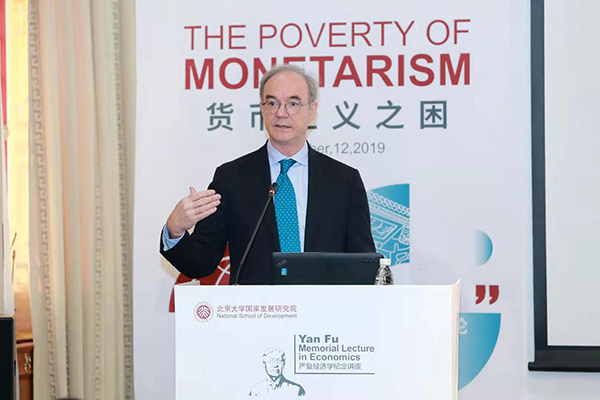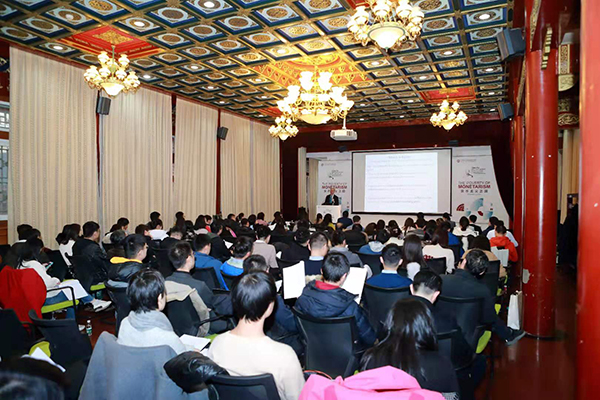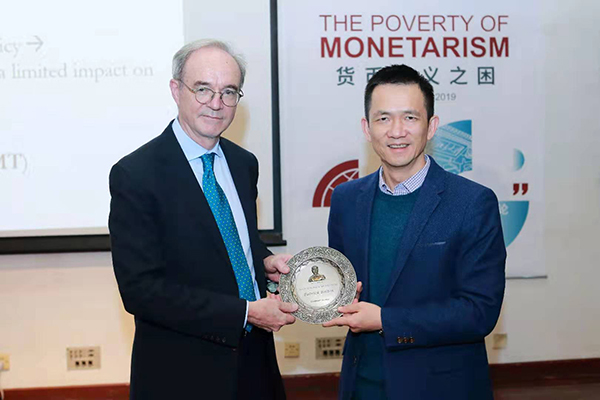
12th December 2019 – the 17th Yan Fu Memorial Lecture in Economics was held in the National School of Development (NSD), Peking University. Yan Fu Memorial Lecture in Economics commenced in 2001 to commemorate Mr. Yan Fu’s contributions, as well as to inherit his legacy in promoting the discipline of economics of modern China. Every year, the National School of Development extends invitation to one internationally renowned economist to speak as guest lecturer.

The guest lecturer for this year’s Yan Fu Lecture is Professor Patrick Bolton, the Barbara and David Zalaznick Professor of Business at Columbia University and visiting Professor at Imperial College London, who contributed significantly in the field of contract theory, corporate finance and industrial organization.
Prof. Yao Yang, Dean of NSD opened the event on behalf of the school.
Prof. Bolton's speech was on “The Poverty of Monetarism” which aims to provide a critical discussion of monetarism and difficulties of understanding macroeconomic developments post Great Financial Crisis (GFC) through a traditional monetarist lens.

Prof. Bolton first reviewed the definition of monetarism from both a theoretical and policy perspective by quoting from Friedman and Schwartz(FS, 1965), the originator of monetarism. FS proposed that there is a one-to-one relation between changes of money stock and changes of money income and prices. As for practice, they conjectured that shorter-period changes in the rate of growth of money stock can exert a sizable influence on the rate of growth of output while in longer-period the change produced by money stock are reflected more in different price behaviors rather than in output. Prof. Bolton cited the critique by an eminent economist, Hyman Minsky, on FS to show that people cannot understand macro conditions excluding money all out and a more complete model integrating monetary and financial system into existing framework should be developed to explain what FS have left out ,especially how monetary and financial crises are generated , a crucial question raised by GFC.
From an empirical dimension, Prof. Bolton pointed out that some monetary puzzles exist and the highlight lies in the relation between money growth and inflation, GDP growth as well as the wealth of nations. As FS predict higher inflation & income is the result of higher money growth, trends for US indicates that between 1930 to 1955, GDP, CPI and M2 move in tandem consistent with FS, while conditions since 1955 are in contradiction with FS, differed in periods though. Trends in China and Japan share similar puzzles.
Due to these puzzling facts, Prof. Bolton embarked on enriching the monetarist framework through 3 avenues.
The first focus on “money is equity” . Based on his joint paper with Haizhou Huang from the China International Capital Corporation, Prof. Bolton suggested that the choice between issuing money (and domestic debt) or foreign debt when a nation seeks to finance its investment can be seen as an analog of a corporation's choice of capital structure , thus rendering fiat money the equity for a nation.
Benefits of money are obvious while the cost is inflation which is a transfer of value from previous currency holder to newly-in ones, also a parallel of dilution costs for shareholders in corporate finance. Prof. Bolton holds that optimal financial structure of a nation pits inflation costs (transfer of value) against debt-overhang costs.
The second argument ” money is Sovereignty” , also from a joint paper by Bolton and Huang, sheds light on problem of currency union. They pointed out that the cost of monetary union is loss of sovereignty, meaning foregoing the option the monetize debt in exigent circumstances while the benefit of union is elimination of monetary policy externality emerging when exchange rate is sticky and one country can boost its own purchasing power by printing more money. Their theory also puts the spotlight on the two institutional design flaws of the current Eurozone.
Finally, Professor Bolton emphasized the role of central bank, lighting the necessity of coexistence of inside and outside money, concluding as “money is central banking” . The classical Bagehot's Dictum which prescribes that central banks should” lend without limit, to solvent firms, against good collateral, at ‘high rates’” , defines the lender of last resort (LOLR) role for central bank and is embodied by many central bank policy principles. Based on practices after GFC, Professor Bolton believes that, however, appropriate LOLR policy is to “ do whatever it takes ” to save the banking system thereby allowing for efficient continuation and avoids destructive liquidation. He used the example of conservatorship of Fannie Mae and Freddie Mac by US government who reaped much profits as real estate market recovers from recession to illustrate more details of LOLR.
By discussing 3 lens to broaden monetarist framework, Professor Bolton concluded that the value of money is more than the expression of “helicopter money” and hence LIBRA, a kind of cryptocurrency proposed by Facebook, is not money. He also remarked that many post crisis theory and policy challenges still pend.
During the question and answer session, Professor Bolton responded to questions from audience. At last, Prof. Yao Yang presented a special souvenir of the Lecture to Professor Bolton on behalf of the school, and the lecture ended amidst applause.
